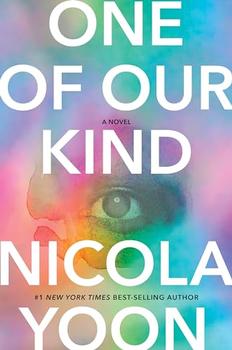Summary | Excerpt | Reading Guide | Reviews | Beyond the Book | Readalikes | Genres & Themes | Author Bio

A Novel
by Nicola Yoon
But the most incredible part to Jasmyn, the part that makes her smile wide, is that all the figures are Black. Santa and Mrs. Claus. The angels and the elves. Baby Jesus and the Three Wise Men. Every one of them, a shade of brown.
"Just beautiful," she says.
She's seen Black Santas before, of course. For the last two years, she's made a special effort to seek one out for their six-year-old son, Kamau. And to this day, she still remembers the first time she ever saw one. She'd been nine and overheard their neighbor telling her mother about it.
"I hear they got themselves a Black Santa down at the mall," the woman had said.
Jasmyn begged her mother to go and meet him. The following weekend, along with every Black family in the neighborhood, they went. The line was long and her mother was mad by the time they got to the front. But Jasmyn sat on Santa's lap and asked him for the thing she thought a Black Santa would understand: money. Money so her mother didn't have to work two jobs. Money so she could have her own room and not have to share the living room with her sister, Ivy. Money so they could afford a house in a neighborhood that was less dangerous. It didn't occur to her to ask for one in a neighborhood that wasn't dangerous at all.
Six weeks later her grandmother died and left Jasmyn's mother enough money to quit one of her jobs for a few months. Her sister dropped out of high school and moved in with her older boyfriend. "God works in mysterious ways," her grandmother always said. It seemed to Jasmyn that Santa did, too.
King leans closer to her so he can get a better view of the display. "We definitely making the right move, baby," he says.
He says it because at first, Jasmyn had taken some convincing.
Liberty is something more than a neighborhood and less than a township. According to the brochure, it's a community. A gated, outrageously wealthy, and Black community.
"A Black utopia," King had said when he first told her about it. "Everyone from the mayor to the police chief to the beat cops to the janitors, all Black."
"How can they keep it all Black legally?" she asked.
Kingston eyed her like she was naive. "How many white folks you know want to move into a predominantly Black neighborhood?"
She conceded the point.
"It's a place where we can be free to relax and be ourselves," Kingston said.
She was skeptical still.
"There are no utopias," she told him. Certainly not for Black people and certainly not in America. Not anywhere in the world, if she was being real. She reminded him that Black utopias had been tried with little success before: Allensworth and Soul City, for example.
"This one will last," he'd insisted.
And she'd wanted him to be right. Wanted to live in a place surrounded by like-minded, thriving Black people. A place with wide, quiet streets where their son could ride his bike, carefree, with other little Black boys. A place where both King and Kamau would be safe walking around at night. She imagined them going for a stroll on some cold evening, both of them wearing hoodies. She imagined a cop car pulling alongside them. But this cop car had Black cops, and they were slowing down just to wish them a good evening.
But Liberty's wealth got under her skin. Would she fit in with rich people, even if they were Black? Would she ever get used to being wealthy herself ? And worse than that insecurity was this: she didn't
want to turn into one of those bougie Black people who forgot where they were from—and the people they came from—as soon as they got a little walking-around money.
"Baby, what are you talking about?" King had asked. "We haven't lived in the hood for a minute now," he said.
They'd argued in the kitchen of their two-bedroom apartment in the mid-city district. The neighborhood was working class, with quite a few older immigrants, their first-generation kids, and, of course, Black people. It wasn't rundown by any means and it certainly was better than Compton, where Jasmyn and King had both grown up. Still, there were homeless tents every few blocks or so. Some stores were still boarded up from the protests against police brutality a few summers before. The public school they sent Kamau to was decent but didn't have nearly enough Black teachers. Living there made Jasmyn feel like she'd come far from where she started out, but not too far. She still felt a part of the pulse of the Black community in LA.
Excerpted from One of Our Kind by Nicola Yoon. Copyright © 2024 by Nicola Yoon. Excerpted by permission of Knopf. All rights reserved. No part of this excerpt may be reproduced or reprinted without permission in writing from the publisher.
Your guide toexceptional books
BookBrowse seeks out and recommends the best in contemporary fiction and nonfiction—books that not only engage and entertain but also deepen our understanding of ourselves and the world around us.